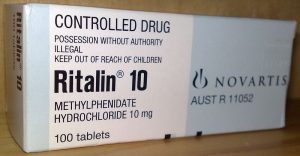 Chess tournaments have long been ridiculed for required drug testing. And in truth, those requirements have mostly been about satisfying International Olympic Committee standards so that Chess might be recognized as a “mind sport” and just possibly included in future Olympic games.
Chess tournaments have long been ridiculed for required drug testing. And in truth, those requirements have mostly been about satisfying International Olympic Committee standards so that Chess might be recognized as a “mind sport” and just possibly included in future Olympic games.
Scientists, though, have now confirmed the potential benefits of performance enhancing drugs for Chess players. As reported in the journal, European Neuropsychopharmacology, a study of 39 rated Chess players over several thousand games found their winning results significantly improved after taking modafinil (marketed as Provigil), methylphenidate (Ritalin, Concerta, and Daytrana), or caffeine.
In the study, players were paired against a computerized Chess engine and given 15 minute time limits. Surprisingly, compared to those who were administered a placebo, players on all three of the drugs took longer to make their moves and lost more games on time controls. When controlling for game duration and excluding games lost on time, however, modafinil improved performance 15 percent, methylphenidate 13 percent, and caffeine 9 percent.
The researchers concluded that stimulants may lead to “more reflective decision making processes.” As a result, performance under relaxed time constraints may be enhanced.
In rapid and blitz games, though, use of these drugs could be counterproductive.
[via World Chess]
- Comments Off on Doping For Chess
Trending
- Massdrop.com
- Oh the Irony—Illuminati Card Game Continues to Inspire Conspiracy Theorists
- Footprints, an Educational Ecology Game
- Home
- USPS Adds Board Game Flat Rate Box
- Baila, the Estonian Drinking Card Game
- Crystal Caste Wins Dice Patent Suit Against Hasbro
- Mirror Game, Red and Blue
- Are Board Games Dangerous?
- Board Games Based on Hindu Mythology
Archives
Most Popular Articles
- Oh the Irony—Illuminati Card Game Continues to Inspire Conspiracy Theorists
- The 20 Most Valuable Vintage Board Games
- The Truth About Dominoes On Sunday in Alabama
- Sequence Game, and Variants
- USPS Adds Board Game Flat Rate Box
- Baila, the Estonian Drinking Card Game
- The 13 Most Popular Dice Games
- Are Board Games Dangerous?
- Guess Who? The Naked Version
- What Happened to the Jewel Royale Chess Set?
Recent Posts
- Toy Fair 2019—Breaking Games
- Talisman Kingdom Hearts Edition
- Toy Fair 2019—Winning Moves
- Toy Fair 2019—Games Workshop
- Toy Fair 2019—Star Wars Lightsaber Academy
- Toy Fair 2019—Stranger Things Games
- Toy Fair 2019—HABA
- Licensing Roundup
- Game Bandit
- 2018 A Difficult Year For Hasbro But Not For D&D Or MtG
Recent Comments
- on Toy Fair 2019—Winning Moves
- on Game Bandit
- on Second Look—Dungeons & Dragons Waterdeep Dragon Heist
- on Crowdfunding Highlights
- on Beyblade SlingShock
- on Game Bandit
- on Game Bandit
- on Watch This Game!, the Board Game Review Board Game
- on Second Look—Vampire: The Masquerade 5th Edition
- on Palladium Books Loses Robotech IP License, Cancels Five-Year-Overdue Robotech RPG Tactics Kickstarter




